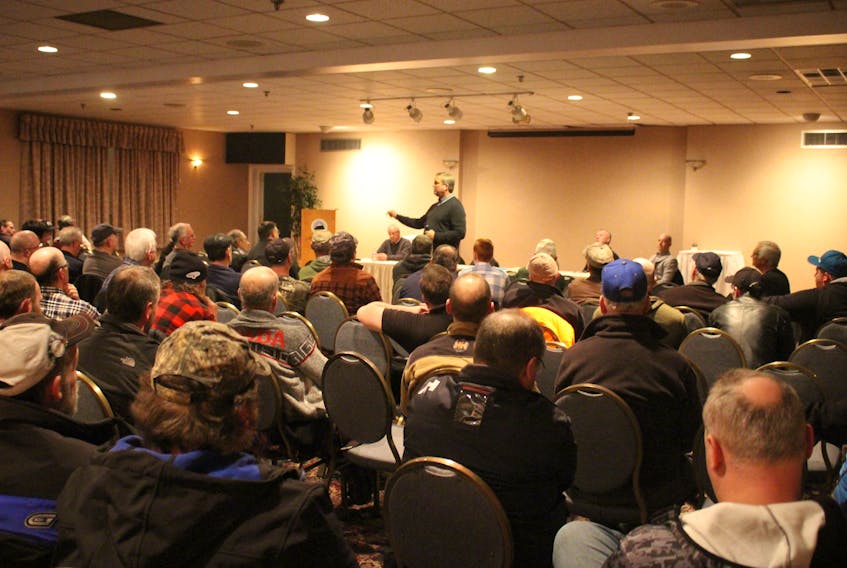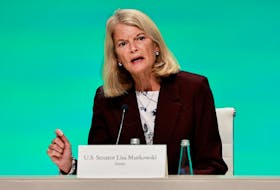GRAND FALLS-WINSOR, NL – Despite a lot of back and forth between the crowd and Fisheries and Land Resources Minister Gerry Byrne, in the end, the message from all sides was loud and clear:
Newfoundland and Labrador must gain authority over its inland waters.
“We are the greatest conservationists of Atlantic salmon in North America,” Byrne told a group of about 100 fishermen gathered at the Mount Peyton Hotel March 22. “Listen to us.”
Angler Bruce Andrews organized the meeting in response to ongoing dissatisfaction with lack of information from the federal Department of Fisheries and Oceans (DFO) regarding a salmon management plan for the coming season, among other issues. Panelists invited to speak included representatives of CORA (Citizens Outdoor Rights Alliance) and local politicians, in addition to the minister.
“Last summer, after the mid-season review, we were kicked off the rivers,” CORA president Gary Gale said in his opening statement, noting many of the rivers were still open to catch-and-release fishing, which still kills fish.
“If you’re going to close the rivers, close them to all, not just the retention anglers.”

While most of the rhetoric in the room had to do with the respective values of catch-and-release versus retention fishing – including the often-overlooked mortality associated with the former and the usefulness of the presence of those practising the latter when it comes to enforcement of regulations – the majority of anglers present came down on the side of retention.
All but a dozen or so raised their hands when asked if they would stop fishing for salmon altogether this year if a catch-and-release only program was imposed.
Results of this informal poll were similar to those of the mid-season ban on retention fishing in the Exploits River after the mid-season review last year. The mayors of both Grand Falls-Windsor and Bishop’s Falls spoke to the emptying of parks and RV campgrounds in their communities when the ban came down.
The salmon fishery accounts for about $10 million in revenue to central Newfoundland every year.
Both Gale and the minister argued not for halting catch-and-release altogether, but rather its regulation. Andrews, a life-long angler, said he was appalled when he learned that about 10 per cent of fish released after being hooked did not survive.
Byrne took it one step further and decried the oversight of the Atlantic Salmon Federation (ASF), based in Maine and New Brunswick, over Newfoundland and Labrador waters.
“The Exploits River produces more fish than all of Nova Scotia’s rivers combined,” he said, noting that while mainland and other maritime salmon zones are classified as endangered, this province’s zones are mostly healthy, with the exception of one that is deemed threatened. “And yet the solution is to import strategies of failure. To import solutions from the mainland.”
Not everyone agreed with Byrne’s assessment. Angler Nehemiah Pinsent rose during the question period and said the minister’s implication that the failure of other zones was the result of catch-and-release was misleading and irresponsible. He said habitat destruction played a much more important role.

“We can learn from the outside, here,” Pinsent said. “Yes, there needs to be regulations on catch-and-release, but I feel there’s just a big wedge being driven between the catch-and-release angler and the retention angler.”
The meeting, which lasted nearly three hours, comes on the heels of several years of decreasing salmon returns in the province. Byrne said all data points to fluctuations in population being the norm, and also that more than 90 per cent of salmon mortality occurs in the ocean before the fish get to the rivers as a result of commercial fisheries, but also because of predation by harp seals.
The topic of poaching was also broached as a cause for decreases in certain areas, but the general consensus was that more retention anglers on the river would impede illegal activity as well.
Related:
Fisheries Minsiter gerry Byrne denied access to DFO Science meeting on salmon
Simms in favour of reduced retention angling over catch and release for NL
Concern about the number of tags to be issued this year was evident, and while not making any promises, Byrne said in his capacity as issuer of permits on behalf of the federal government, his administration had ordered six tags per angler.
This statement was met with hearty applause, as was his avowal to work towards provincial management of inland waters, something every other province enjoys.
Afterwards, Andrews said he was pleased with the turnout and not surprised that emotions ran high. In his opening remarks, he spoke about the need to have the voice of the people on the rivers represented at DFO meetings, something many said has been sorely lacking.
“I think it went very well,” he told the Advertiser. “I think there’s a message that’s going to find it’s way to DFO from tonight.”









